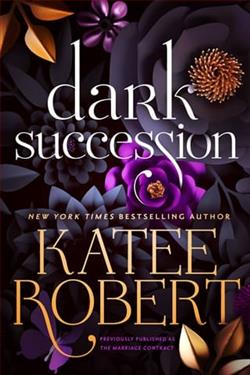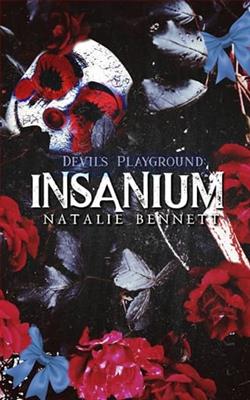Page 58 of Of Angels & Absolution
“Mercy,” I say, searching her sweet blue eyes. “What you said back there… Did you mean it? Or was it born from your desire in the moment?”
“What did I say?”
“That your body is mine.”
We stare at each other a long moment. At last, she nods shyly.
“If you want it,” she whispers, her gaze hopeful now and so painfully innocent. She doesn’t know the things she’s promising, the dark desires that lurk in my heart.
“Lamb,” I say, linking my hand with hers and pressing it to my chest. “Any man would be lying if he said he didn’t. Your body is a sacred temple. It would bring any man to his knees. But if you meant those words, I want you to know what you’re promising.”
“What about you?” she asks timidly. “Would you go to your knees?”
“Only for God,” I say. “I took a vow, when I joined the priesthood. Not to the church, but to myself.”
“Could I?” she asks, looking up at me through her lashes with a look that is far more temptress than lamb. “For you?”
I smile down at her, stroking her hair across the pillow. “Not for me,” I say with regret. “But you’ve been such an obedient lamb. Maybe you could kneel for your brother again.”
“It’s not a sin?” she asks.
“No, child.”
“Is it a sin to want you?” she asks, casting her gaze down.
“Your desire is a gift, but it’s not a gift for me,” I say gently.
That may be the deepest regret of my life, especially when she squirms over on the bed and looks up at me with those big, imploring eyes. “Will you stay? Just until I fall asleep?”
It’s all I can do not to let my imagination run wild again. But I keep it in check and nod, then rein in my impulses as I set my shoes next to hers. I lie on the bed facing her, our faces inches apart, and link my fingers through hers, holding them between our chests, so we can’t press in too close.
“Will you sing to me, Father?”
I murmur a hymn to her, and after a time, her lids flutter closed, and she sleeps like only the innocent can. I would envy her that if she wasn’t so deserving.
*
The next day, I step out the back door of the church and pause, taking in the grey day before me. When I need solace and peace, I walk out into the graveyard and beyond, into the garden. Growing up, I didn’t have many green spaces around, and my knowledge doesn’t extend beyond the basics of the plants around me, but I’ve learned to enjoy the view from the front windows of the rectory. When I’m up early, before anyone else rises, kneading dough or sitting down to prayer, I often spot birds and animals out the kitchen windows. This time of year, it’s quiet, though, as if the wildlife has fled campus along with the students.
Still, I like taking stock of the garden, walking the labyrinth while in contemplation, watching the world change before my eyes from one season to the next. Even now, when the earth lies dormant, my feet on the solid ground remind me of my foundation, the one I’ve made here, in this new life. The cold, wet wind in my face reminds me that I’m far from home, from the demons that haunted my life before this one. In NewYork, we would have snow, biting cold, but despite the warmer temperatures here, the wetness in the air creeps in like a chill that never goes away. I don’t mind so much. There are worse things.
I descend the steps and walk through the graveyard with its greying stones, the oldest crumbling, the newest looming stark against the blur of fog under the grey sky. I spot a young woman from our congregation at her father’s grave, on a square of sod that hasn’t taken root and won’t until spring. Her head is bent, and her shoulders shake. I think of my own father’s unremarkable headstone in an endless cemetery back home, one of the many departed souls in a city that doesn’t so much as blink at death, even when it’s a respected priest.
No tears were shed on his grave, and none will be.
I offer comfort, but the woman asks for solitude, so I leave her and make my way out further, to the fence, and through the gate to the garden. I’d like to bury my hands in the soil, as if they are roots, ties that can anchor me to this plot of earth. But for now, I only stroll the circular design, trying to find my way to some kind of clarity that hasn’t been offered to me in a long time.
I’m already thinking ahead, thinking about the warm dough waiting for me in the small, simple rectory where I live behind the church. I’m imagining how I will use it to work out my frustrations, how I will smooth my hands over the ball of warm dough, dust it with flour, and slide it into the oven. How I will wrap it in a cloth when it’s done baking, how it will warm me as I carry it across campus. How she’ll smile when I deliver it into her waiting hands, still warm and fragrant. I picture us sitting together in her room, tearing off pieces with our hands, breaking bread together in our own private communion.
I hurry through the rest of the garden and go inside to check if the dough has risen.
Later, I cross the campus toward the dormitory, my steps increasing in speed as I approach. Is she sitting at the window, and will she see me coming? Will she be as eager to see me as I am her? Suddenly, I’m convinced I am nothing but a fool.
I slow my pace, and just then, I spot a lone, still figure standing under a barren tree just a few paces from the entrance. A momentary flicker passes through me, as if I’m still a child, one being caught sneaking into a place where he doesn’t belong. Fear and guilt twist together into a braid of defensive self-righteousness, the kind which my father loved nothing more than to beat out of me, relishing each stroke like the sweetest morsel.
We stare at each other for a few seconds, each of us debating the next step, the next word. I must tread carefully. I am the guardian of these children, the guide, however misguided. I should not be here. But he should not be the one to tell me that.
“Hello, Saint,” I say. “You do know campus closed yesterday, don’t you?”















